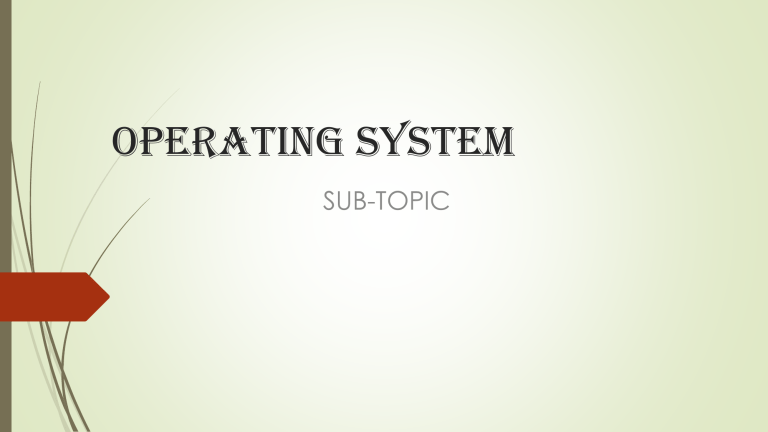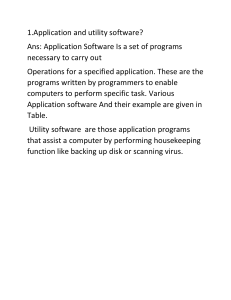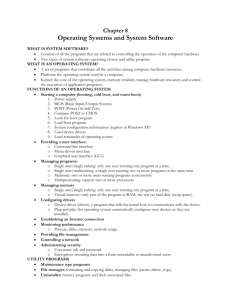
OPERATING SYSTEM SUB-TOPIC DEFINITION OF OPERATING SYSTEM Operating System(OS): Operating System (OS) is an important part of a computer. OS intermediates between the user of a computer and the computer hardware. Goals of using OS: To Control/execute user/application programs. To make the computer system convenient to use. Easily to solve user problems. Use the computer hardware in an efficient manner. TYPES OF OS 1. Single user Operating System i. single user, single tasking OS ii. Single user, multi- tasking OS 2. Multi-user Operating System 3. Network Operating System 4. Time-sharing Operating System 5. Real time Operating System 6. Distributed Operating System 7. Embedded Operating System FUNCTIONS OF OS 1. Resource management 2. Task management 3. File management 4. User interface Some operating system used by modern computers (PCs) 1. Microsoft windows, windows XP, windows 8, windows 10 etc Macintosh (Mac) Linux Some common mobile operating systems Android OS Apple iOS Blackberry OS Microsoft windows phone UTILITY PROGRAMS/SOFTWARE System utility software is required for the maintenance of computer. System utilities are used for supporting and enhancing the programs and the data in computer. Some system utilities may come embedded with OS and others may be added later on. Some examples of system utilities are: Examples Utility programs include: Anti-virus: utility to scan computer for viruses. Data Compression: utility to compress the files. Cryptographic: utility to encrypt and decrypt files. Disk Compression: utility to compress contents of a disk for increasing the capacity of a disk. Disk Partitioning: to divide a single drive into multiple logical drives. Each drive is then treated as an individual drive and has its own file system. Disk Cleaners: to find files that has not been used for a long time. It helps the user to decide what to delete when the hard disk is full. Backup: Utility to make a copy of all information stored on the disk. It also restores the backed up contents in case of disk failure. System Profiling: Utility provides detailed information about the software installed on the computer and the hardware attached to it. Network Managers: to check the computer network and to log events.

